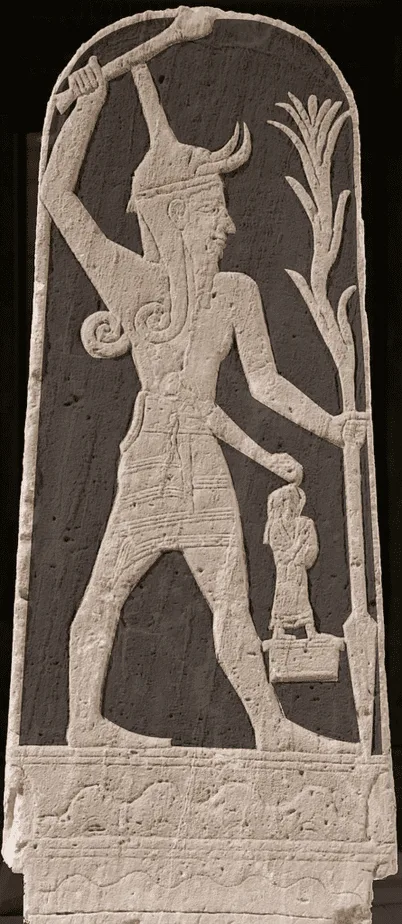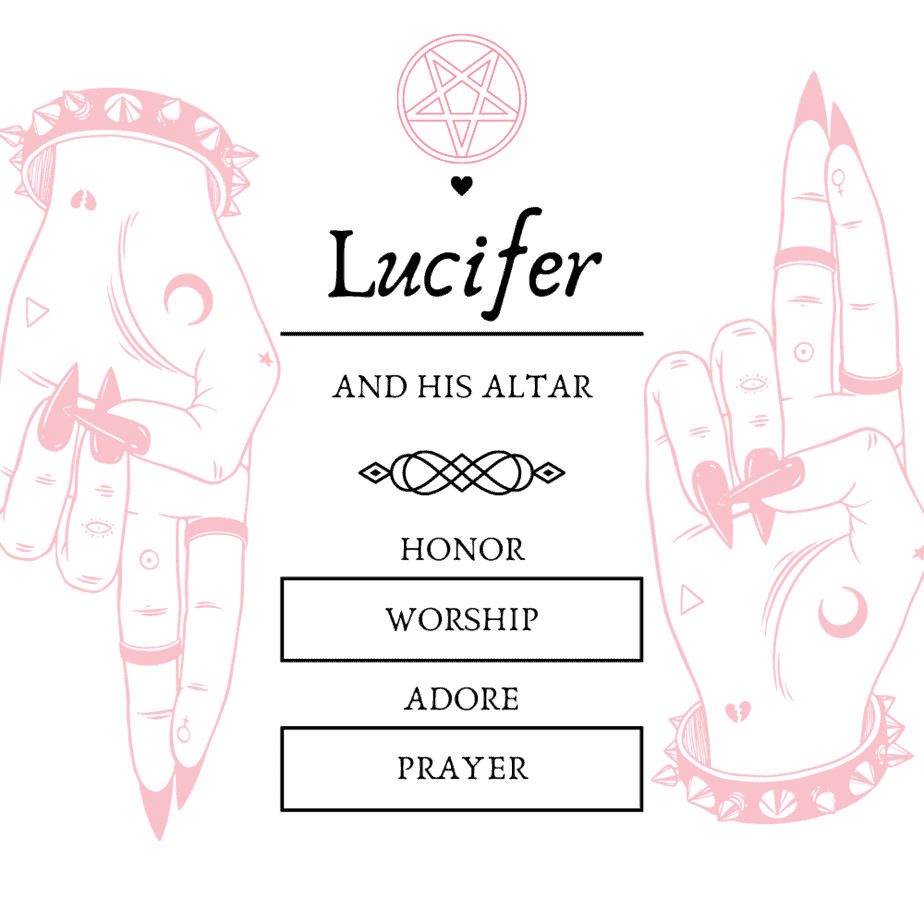Please note that posts on this site may contain affiliate links
In the Ars Goetia, Baal or Bael is a demon described in demonic grimoires such as the Lesser Key of Solomon, the Pseudomonarchia Daemonum, and the Dictionnaire Infernal. He is depicted as a hoarsely voiced king who has the power to make men appear invisible and rule over 66 legions of demons.
The lesser key of Solomon says that he appeared in many forms, including the form of a cat, toad, man, or a combination thereof.
The Pseudomonarchia Daemonum and the Dictionnaire Infernal state that he appears with the heads of a cat, toad, and man all at once.
In the Livre des Esperitz, Bael (as Beal) is described as a King who rules over six legions of demons. He also has the power of invisibility and is capable of garnering the favor of others. The Liber Officium Spirituum states he also rules over the sciences and love.
Bael is a demon who protects humans from pestilence. He is also known as Beelzebub and appears in visions to me as a humanoid figure with the head of a fly and many red eyes. Overall, Bael is a popular familiar spirit that controls many legions of spirit familiars.

Why Worship Baal?
A common misconception about demons is that they are evil beings who are always looking to harm us. While this is often true, demons are actually neutral beings who exist between good and evil. They are neither completely good nor completely bad, so they can interact with both sides of the spectrum.
So when you perform a ritual for a demon, you are not doing anything wrong; rather, you are simply connecting with the demon’s energy. It is important to remember that demons are not inherently evil, and so you cannot expect to get hurt by performing these rituals.
Baal is a deity and demon associated with gaining popularity, invisibility, love, and science. As such, Baal is the God of illusion, deception, and manipulation. He is the spirit of shape-shifting, related to an old Canaanite deity. A fertility deity and Lord over instinctual impulses, this demonic spirit is one of many demons known as a demon of enlightenment.
As with most deities, Baal enjoys followers who are clever, intelligent, patient, and willing to put forth effort. Many theistic Satanists work with this demon, as well as some eclectic witches like myself. Bael fits in perfectly with my pagan practices.
To please Baal, you’ll want to cultivate these traits. You might consider practicing meditation and visualization techniques on your own in order to attain a more focused mind.
If you please this demon or God, you can take on his gifts.

Bael represents strength and protection. He helps us learn skills we might need later. He teaches us about our own capabilities and the limitations of others. He gives us the ability to heal ourselves and others. His magic allows us to overcome obstacles and achieve success.
Bael teaches us to be positive, focused, disciplined, persistent, and resourceful.
When we call upon Bael’s aid, he helps us strengthen our will, develop confidence, improve communication skills, raise intuition, enhance creativity, increase endurance and sharpen focus.
We need help from Bael because he protects us from physical harm and provides guidance through difficult times. We can ask him for courage, wisdom, and strength at any time.
Bael teaches that we must protect our loved ones and ourselves. We must guard our thoughts and words, our possessions, our bodies, and even our homes. We must keep these areas safe. When we honor him, Bael guards us by protecting us from evil influences.
In modern times, Baal is often associated with magic spells, divination, and fortune-telling. He is also viewed as a magician, shaman, or medium.
Worshipping Baal requires dedication. You must be willing to sacrifice your time, energy, and resources to please this God.
It’s important to note that Baal only responds to sincere devotion in religious rites. His demonic powers are not meant for just everyone but for those truly devoted.

What To Put On An Altar To Bael
To work with infernal powers, I have found it very useful to have a space dedicated to each demon I communicate with.
I use my altar to commune with the demons I call upon. It helps me to focus and concentrate on the task at hand.
You can also use a candle to represent the demon, but remember that candles burn out, so you will need to replace them periodically.
Bael is the Lord of the East, so a space that faces the East will be best.
Consider Bael’s correspondences:
- Fire
- Espionage
- Invisibility
- War
- Rain
- Storms
- Love
- Science
- Royalty (He was the first monarch of Hell)
Bael has a nasty connection to child sacrifice. This can be worked with, still, with bread or other offerings shaped like babies. If you can stomach such an offering, I’ve found them to be very helpful in strengthening my connection with any deity or demon associated with such a practice.
The best offerings for Bael include loaves of bread, olive oil, insect wings, dead beetles that were not killed by your hand, wasp nests, snakeskins, carnelian, fruits and vegetables, rainwater, clean water, and grains of all kinds.
Decor for an altar to Bael can include insects in shadowboxes, candles, rainwater, and symbols that remind you of war, royalty, and espionage. Daggers will find a loving home on his altars.
Bael’s day is Saturday because he is strongly associated with Saturn.

Speaking To Bael
In order to contact Bael, you can speak to him in your mind. The best way to do this is to imagine that you are talking to him telepathically. You might think about what you would like to ask him, then focus on the question in your mind.
When you invite a demon into your home or your body, you should try to dress nicely and avoid wearing anything too sloppy. Demons are considered divine and royalty, and they are usually honored guests.
When you speak to Bael, you should treat him like any other deity. Be polite and respectful. Demonkind is a higher order of being than humans, and they deserve respect.

Bael’s Personality
Bael is a god of the desert and the Wanderer of the Wasteland. He is the master of the Left Hand Path and is the teacher of the Way of Suffering.
His teachings focus on the importance of accepting reality and learning to live with it. He is known for his ability to bring out the worst in people and to reveal their true nature.
He is also known for his harshness and for his ability to punish those who do not listen to him. However, he is also known for his loyalty and for his willingness to help those who need it. He is also known as the God of warriors and is often depicted as a man wearing armor.
Bael is a leader who demands respect from his followers and does not tolerate insubordination.
Bael is often described as being stoic, but he is actually quite emotional. He is able to master his emotions and can teach others how to do so as well. He can help you learn to accept the fact that sometimes things will go wrong and that you cannot always get what you want.
In addition to teaching you about acceptance, Bael can teach you about the power of the wanderers. The wanderers are those who travel alone, without companionship. They are often misunderstood, and they are often lonely. But they are powerful, and they can teach you how to overcome your own loneliness.
When faced with something that cannot be changed or overcome, Bael can help you find ways to cope with the situation. He can teach you how to accept the pain and move forward without letting it consume you.
A person who has been given the gift of wisdom can use it to help others, but only if they are willing to accept responsibility for their actions. The gods do not give gifts without expecting something in return. They expect us to act responsibly and wisely and to live up to our responsibilities. If we fail to do so, then the gods will punish us.

Bael Facts
Other names: Beelzebub, Bal, Ba’al Zebub, Baal Zebulon
Rulerships: discipline, wind, storms, war, love, science, health, and protection against pestilence
Military Rank: King
Element: Earth
Colors: Black and Red

Biblical Ba’al
Baal is a Canaanite and Phoenician deity and the firstborn son of the chief God El. He is depicted as a bull or ram and associated with fertility. His name means “lord” or “master.” He is often represented as a warrior, usually standing atop a chariot drawn by two horses. He also sometimes appears as an eagle or falcon.
Baal was a fertility god, often associated with rain and storms. He was also considered a weather god. His name means “lord” or “master.” There were many different Baals throughout history, including the Canaanite God Baal Zebub, the Phoenician God Baal Hammon, and Baalshamin of pre-Islamic Palmyra.
Baal is a god of fertility and rain, and he is also associated with thunderstorms. He is considered a storm god by many scholars. Baal is mentioned in the Bible in Numbers 22:41, Judges 2:13, Judges 6:25, Judges 6:28, Kings-1 16:31, and other verses.
How Is Baal Pronounced?
The word “Baal” comes from the Hebrew language and means “lord.” It was used by ancient Israelites to refer to God. In modern times, it has come to mean any god or idol.
The correct pronunciation of Baal is Bah-ahl. Baal is therefore pronounced with two syllables, like the correct spelling of it, Ba’al. Technically, in Hebrew, the second syllable is pronounced with a slightly more inflected “ah” sound, which is pronounced midway between an “ah” and an “eh” sound, as heard in the audio pronunciation.
Customer review: I bought this item because I wanted to ask Lucifer to help me find a job. I was unemployed for almost two months and I felt like he wanted something more tangible to represent my worship for him. So, I decided to make an altar for him.
I placed some flowers, candles, and a picture I drew of him on the altar. I felt like he was helping me. And then, I finally hit the jackpot and got my dream job!
So, if you want to thank Lucifer for something, this is a good way to do it. Just remember to leave out food or drink for him every now and then.


